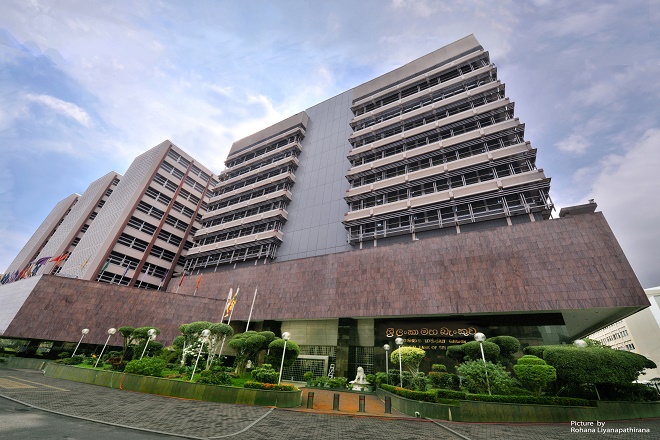May 09, 2017 (LBO) - Sri Lanka's Monetary Board held key interest rates unchanged on Tuesday on slower inflation, a month after hiking rates, a monetary policy statement said.
Colombo Consumer Price Index headline inflation decelerated to 6.9 per cent in April from 7.3 per cent in March, year-on-year, a factor which supported the decision, the statement said.
The growth of credit extended to the private sector by commercial banks decelerated to 21 percent by end February and 20.4 percent by end March, year-on-year, although growth of broad money (M2b) remained high at 20 percent in March.
"In the external sector, the cumulative trade deficit increased to US dollars 1.7 billion in the first two months of 2017 from US dollars 1.2 billion in the same period of 2016."
"This was a reflection of the combined impact of the decline in export earnings and increased expenditure on imports, particularly as a result of the drought conditions."
The government securities market and the Colombo Stock Exchange saw foreign inflows in recent months, while the government issued its 11th International Sovereign Bond (ISB) worth US dollars 1.5 billion this month, priced favourably at 6.2 per cent.
"These inflows, along with other expected financial inflows to the government and the likely disbursement of the 3rd tranche under the IMF Extended Fund Facility (EFF), would support the balance of payments and the country’s reserve position."
As at end April 2017, gross official reserves were estimated at US dollars 5.0 billion compared to US dollars 6.0
billion at end 2016.
Given these factors, the Monetary Board decided to maintain the Standing Deposit Facility Rate (SDFR) and the Standing Lending Facility Rate (SLFR) unchanged at 7.25 per cent and 8.75 per cent respectively.
Full policy statement:
As expected, the Colombo Consumer Price Index (CCPI, 2013=100) based headline
inflation, decelerated on a year-on-year basis to 6.9 per cent in April 2017 from 7.
buy bactroban online buy bactroban online no prescription
3 per cent in
March 2017, and CCPI based core inflation also decelerated to 6.8 per cent in April 2017 from 7.3
per cent recorded in the previous month. It is expected that inflation based on the National
Consumer Price Index (NCPI, 2013=100), which edged up in March 2017, will also display a
similar decline in April 2017. Supported by monetary policy adjustments from end 2015, inflation
is projected to decelerate gradually to the desired mid-single digit levels by end 2017, although
there could be some monthly fluctuations due to short term supply side disruptions and the base
effects of tax revisions in 2016.
With the upward adjustment in market interest rates, the year-on-year growth of credit
extended to the private sector by commercial banks decelerated gradually to 21.0 per cent by end
February 2017 and 20.4 per cent by end March 2017, from 21.9 per cent recorded at end 2016.
However, despite the deceleration observed during the first two months of 2017, the year-on-year
growth of broad money (M2b) remained high at 20.0 per cent in March 2017 compared to 18.4 per
cent at end 2016 mainly on account of the expansion in credit to both private and public sectors in
absolute terms during the month. This included the expansion of credit to public corporations, some
of which were affected by the impact of the drought and increased international energy prices. As
market interest rates remain substantially high, both in nominal and real terms, it is expected that
credit extended to the private sector will decelerate to the envisaged levels by end 2017.
In the external sector, the cumulative trade deficit increased to US dollars 1.7 billion in the
first two months of 2017 from US dollars 1.2 billion in the same period of 2016. This was a
reflection of the combined impact of the decline in export earnings and increased expenditure on
imports, particularly as a result of the drought conditions. Tourist arrivals and related earnings
improved in the first four months of 2017 in spite of the partial closure of the Bandaranaike
International Airport during the first quarter, although there was a moderation in inflows from
workers’ remittances during the first quarter of the year. Both the government securities market and
the Colombo Stock Exchange experienced foreign inflows in recent months, while the government
issued its 11th International Sovereign Bond (ISB) worth US dollars 1.5 billion this month, priced
favourably at 6.2 per cent. These inflows, along with other expected financial inflows to the
government and the likely disbursement of the 3rd tranche under the IMF Extended Fund Facility
(EFF), would support the balance of payments and the country’s reserve position. As at end April
2017, gross official reserves were estimated at US dollars 5.0 billion compared to US dollars 6.0
billion at end 2016, while the Sri Lankan rupee depreciated by 1.5 per cent against the US dollar
during the year up to 05 May 2017.
Considering the above, the Monetary Board, at its meeting held on 08 May 2017, was of the
view that the current monetary policy stance is appropriate. Accordingly, the Monetary Board
decided to maintain the Standing Deposit Facility Rate (SDFR) and the Standing Lending Facility
Rate (SLFR) of the Central Bank unchanged at 7.25 per cent and 8.75 per cent, respectively. The
Central Bank will closely monitor macroeconomic developments in the period ahead in order to
adopt further measures, if required.
Sri Lanka Monetary Board holds key rates unchanged

